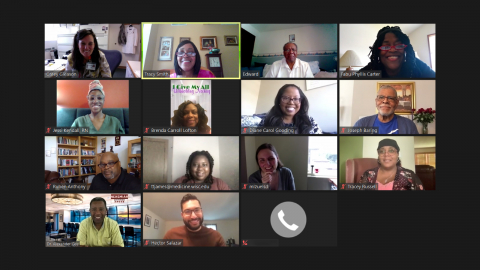
In May 2019, the Wisconsin Alzheimer’s Disease Research Center hosted the first meeting of Black Leaders for Brain Health (BLBH), a group of local African American leaders who advise scientists and researchers in the fields of Alzheimer’s disease and related dementias and cognitive aging. Black Leaders for Brain Health gives African Americans the opportunity to be involved in the development of scientific research, not just be participants in the research. Its goal is to ensure that research with African American individuals accurately reflects the community’s perspectives and is responsive to community needs.
Through a partnership between Drs. Carey Gleason, Fabu Carter and Alex Gee, Black Leaders for Brain Health was established as a service and resource to researchers at UW–Madison. The group fosters collaboration between local African American leaders and scientists.
Black Leaders for Brain Health is composed of about 15 African American leaders of local churches, civic organizations, and academic and health groups. Meetings are held quarterly.
Read a news article about Black Leaders for Brain Health.
Mission Statement
The overarching mission of the Black Leaders for Brain Health is to guide the science of the Wisconsin Alzheimer’s Disease Research Center endeavoring to meet the following goals and objectives:
- Ensure discoveries are directed toward enriching the lives of Blacks affected by Alzheimer’s disease and related dementias (ADRD) — enrich their quality of life, educationally, sharing of scientific findings, and informing the process of discovery
- Hold researchers and their staff accountable to meet medical ethical standards in their treatment of Black study participants, emphasizing professional, transparent, culturally humble, and respectful interactions with participants
- Provide a voice and perspective, so that views of people affected by the science are reflected in scientific endeavors — across all phases of research, including the beginning stages of planning a research project, conducting of studies, as well as the dissemination of findings
- Inform researchers about required cultural competence to guide and improve research projects and research teams
Research Collaboration Request
UW scientists are encouraged to seek input from Black Leaders for Brain Health. Committee members are available to review and advise on studies to help them be more inclusive of Black people and ensure results from research are more relevant to diverse populations. Submit an online Research Collaboration Request.
Publications
Below is a list of selected publications co-authored with members of Black Leaders for Brain Health.
Gleason CE, Norton D, Zuelsdorff M, Benton SF, Wyman MF, Nystrom N, Lambrou N, Salazar H, Koscik RL, Jonaitis E, Carter F, Harris B, Gee A, Chin N, Ketchum F, Johnson SC, Edwards DF, Carlsson CM, Kukull W, Asthana S. Association between enrollment factors and incident cognitive impairment in Blacks and Whites: Data from the Alzheimer's Disease Center. Alzheimers Dement. 2019 Dec;15(12):1533-1545. doi: 10.1016/j.jalz.2019.07.015. Epub 2019 Oct 7. PMID: 31601516; PMCID: PMC6925619.
Contact
If you have questions about our program and would like to reach Black Leaders for Brain Health, please email Tracy Smith.



